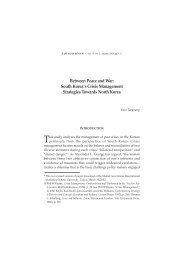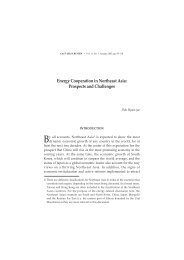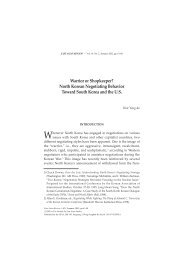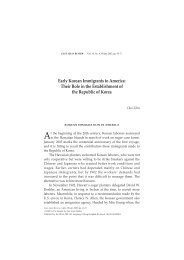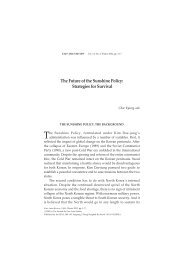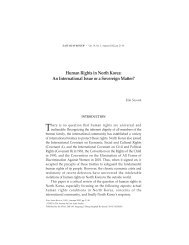Sino-Korean Relations since 1992 - the Institute for East Asian Studies
Sino-Korean Relations since 1992 - the Institute for East Asian Studies
Sino-Korean Relations since 1992 - the Institute for East Asian Studies
Create successful ePaper yourself
Turn your PDF publications into a flip-book with our unique Google optimized e-Paper software.
6 EAST ASIAN REVIEW SPRING 2002<br />
Korea and China in 1995, <strong>the</strong> relations between <strong>the</strong> two nations made<br />
remarkable progress. In short, with 1995 as <strong>the</strong> turning point, <strong>the</strong> two<br />
countries have made slow but steady progress to improve <strong>the</strong><br />
imbalance that characterized <strong>the</strong> relations <strong>since</strong> <strong>the</strong> normalization.<br />
These changes reflect <strong>the</strong> outcome of <strong>the</strong> adjustments made in <strong>the</strong><br />
Chinese policy on North Korea, and demonstrate China’s attempt to<br />
achieve, at once, a qualitative change in its relations with South<br />
Korea, which would lead to partnership.<br />
The imbalance in relations between China and South Korea<br />
stemmed from <strong>the</strong> transitional factors of <strong>the</strong> past enmity between <strong>the</strong><br />
two countries, as well as from <strong>the</strong> structural factors of China’s<br />
domestic politics and <strong>the</strong> special alliance between China and North<br />
Korea. The fact that China-South Korea relations are advancing from<br />
economic areas to areas of politics and military shows <strong>the</strong> ebbing of<br />
<strong>the</strong> transitional and structural factors that had hindered <strong>the</strong> balance<br />
and <strong>the</strong> progress in China-South Korea relations.<br />
During his visit to South Korea in November 1994, <strong>the</strong>n-Prime<br />
Minister Li Peng declared that China would adhere to <strong>the</strong> principle<br />
of independence in its relations to South Korea and North Korea, and<br />
not conduct those relations based on ideology or <strong>the</strong> socialist system.<br />
Li Peng’s emphasis on an independent approach toward Chinese<br />
policy on <strong>the</strong> <strong>Korean</strong> peninsula, a characteristic of <strong>the</strong> post-camp or<br />
post-ideological stance, signifies <strong>the</strong> change in China’s policy, that is,<br />
moving away from <strong>the</strong> ideology of <strong>the</strong> Maoist legacy. China’s postideological<br />
policy on <strong>the</strong> <strong>Korean</strong> peninsula at once changed China’s<br />
alliance with North Korea, which had been based on its past<br />
revolutionary and ideological solidarity, and became a decisive<br />
factor in eliminating structural elements that had hindered balanced<br />
relations between China and South Korea.<br />
Especially, after <strong>the</strong> 15th Central Committee of Chinese<br />
Communist Party, when Chinese leadership shifted from Deng<br />
Xiaoping to Jiang Zemin, policy could move away from <strong>the</strong><br />
continuation of Mao’s legacy, creating conditions favorable <strong>for</strong> a new<br />
way of thinking in China’s policy on <strong>the</strong> <strong>Korean</strong> peninsula.



